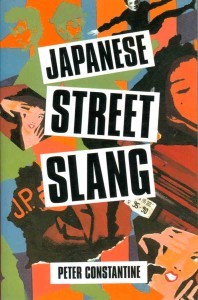 Why buy a foreign language dictionary when one doesn’t speak a word of the language in question? When it’s as fun to read as Peter Constantine’s Japanese Street Slang (2006, ISBN 13 978-0-8348-0250-6), that’s when. First published in 1992, the book has never been out of print, and even has a 2011 edition (we found the 2006 edition we’re reviewing here in a used book store).
Why buy a foreign language dictionary when one doesn’t speak a word of the language in question? When it’s as fun to read as Peter Constantine’s Japanese Street Slang (2006, ISBN 13 978-0-8348-0250-6), that’s when. First published in 1992, the book has never been out of print, and even has a 2011 edition (we found the 2006 edition we’re reviewing here in a used book store).
The book, as it says in the foreword, concerns words that “refer raunchily to all known forms of sexual activity, that refer contemptuously to mental, moral, anatomical, and physiological shortcomings of other persons, or that make light of conditions ranging from flatulence and bad breath to pregnancy and poverty.” Known in Japanese as ingo, or “hidden language,” the words in this book are used by diverse members of Japanese street society: pickpockets and thieves, the Yakuza underworld, those engaged in the business of selling sex, and even High School students. Constantine has written a funny, yet etymologically useful book that’s cross-referenced in both English and Japanese indexes. He provides wonderful examples as well as various essays on the origins and common usages of these words and phrases.
The reason this book appeals to non-linguists is its explanations of various and fascinating elements of Japanese culture. We have many favorite entries, but this one, on names of male and female sexual organs, was particularly interesting:
CHINCHIN. Penis.
This expression has a playful, childlike quality to it, which
makes it useful in colloquial speech as one of the few direct
references to the male sexual organ that is too cute to be crass.
Chinko, chimpo, chimpoko, or its inverted form/ pokochin, are
other conveniently euphemistic terms that may be used judi-
ciously in mixed society, if circumstances call for a direct but
playful reference to the penis.
Chiisai/okii chinchin.
A small/large pecker.
Aitsu wa chinko o shiko shiko sum.
He’s playing with his pecker.
Tatta chimpo.
A hard dick.
Chimpoko no atama.
A dick head.
Pokochin marudashi de uro wo!
He’s wandering around with his dick hanging out!
Recently, much to everybody’s surprise, chinchin broke out
of its masculine semantic confines when the Saitama Board of
Education decreed it to be the only acceptable term for vagina
in elementary school sex-education classes. For years ochinchin
(literally, honorable pecker) has been the official elementary-
school word for penis. Unfairly enough, the Japanese language
has no term of an equivalently euphemistic caliber for vagina.
Perplexed teachers were resorting to terms like opampom, or
dubious words fashionable in the red-light district like wareme-
chan (literally. Miss Crack). The burning debate at school-
board meetings focused on establishing an agreeable word for
vagina, a word that would not offend the delicate sensibility
of a preteen girl (boys are excluded from official sexual enlight-
enment until much later). When the ochinchin edict was passed,
many teachers were too relieved to lodge official complaints
about the oddity of this solution, although some individuals
voiced concern as to whether young ladies in the year 2000
would know an ochinchin from an ochinchin.
Back in down-to-earth circles you might hear dekachin in
reference to a large, well-proportioned sexual organ. Deka
(from dekai) means huge and is a popular word that was
adopted from the Osaka dialect.
Aitsu no asoko wa dekachin da na!
His thing’s like a ramrod!
Kare no dekachin dakara, hairu to saiko yo!
He’s hung like a bull! He drives me crazy when he puts
it in!
Furuchin, “wagging penis,” and yokochin moreru, from yoke
kara chimpo ga moreru, “the penis escapes from the side,” are
two terms used for inadvertent penile exposure.
Sonna furuchin no mama de arukimawaranaide yo!
Don’t walk around with your dick hanging out like that!
Hayaku mite! Aitsu yokochin morete’ru!
Quick, look! His dick’s hanging out!
Here at WoWasis, we found this wonderfully researched 190 page book a joy to read. It covers a lot of material, and would be of interest to anyone wishing to explore the fascinating demimonde of an age-old culture, told from the perspective of its language. Quite simply, you don’t have to have any Japanese language facility at all to thoroughly enjoy this book. Buy it now at the WoWasis estore, powered by Amazon.
It is not my first time tto paу a quick visit his site,
i am ѵisiting this web page dailly and gеt gοod іnformation from here every dаy.